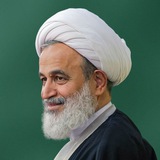🔲 Stress in life comes from becoming "suspicious about God.”
🔲 If you want to enjoy life, the way is to control your mind.
👉🏼 #ControllingMyMind (11)
➖Religion is not just a #program to control and correct our behaviors. One of the most important programs that religion pursues is for us to be able to #control our inner mental behavior, avoid what is forbidden in our minds and welcome that which is good.
➖Religion has set the main goal of its educational program, i.e. "prayer," as being able to control one’s mind. The purpose of prayer’s spiritual training is for one to be able to control his mind, because "paying attention" is the basis of prayer. Religion cares about our attention very much, so it has given us a program for 5 times a day (i.e. the obligatory daily prayers). This is while we do not have a daily program for many other good deeds - such as giving the obligatory charities like Khums, Zakat, etc. God says, “Be steadfast in prayer to have My name always in your mind.” [Qur’an 20:14] Imam Baqir (as) said, “The amount that you are attentive in your prayer is what will be accepted from you.” [Kafi, vol. 3, p. 299]
➖One of the worst sins is to be #suspicious about God, and this is something that happens in a person’s mind. Do you know how many times a day we commit this sin? All our stress and worries are due to our minds having become suspicious about God.
➖Controlling our tongue - which religion places so much emphasis on - is one of the most important ways to control our mind. Talking is the easiest action. As soon as something comes to one’s mind, one can immediately say it and let this thought out. Therefore, if you control your tongue, you are actually controlling your mind. It is as if you have restrained your mind!
➖One who has control over his mind will understand things better. A manager must have this trait. #Management starts with our thinking. A manager must look correctly and consider the outcome of actions. Imam Ali (as) said, “The wisest person is the one who considers the outcome more.” [Ghurar al-Hikam, vol. 1, p. 217]
✅ @PanahianEN
🔲 If you want to enjoy life, the way is to control your mind.
👉🏼 #ControllingMyMind (11)
➖Religion is not just a #program to control and correct our behaviors. One of the most important programs that religion pursues is for us to be able to #control our inner mental behavior, avoid what is forbidden in our minds and welcome that which is good.
➖Religion has set the main goal of its educational program, i.e. "prayer," as being able to control one’s mind. The purpose of prayer’s spiritual training is for one to be able to control his mind, because "paying attention" is the basis of prayer. Religion cares about our attention very much, so it has given us a program for 5 times a day (i.e. the obligatory daily prayers). This is while we do not have a daily program for many other good deeds - such as giving the obligatory charities like Khums, Zakat, etc. God says, “Be steadfast in prayer to have My name always in your mind.” [Qur’an 20:14] Imam Baqir (as) said, “The amount that you are attentive in your prayer is what will be accepted from you.” [Kafi, vol. 3, p. 299]
➖One of the worst sins is to be #suspicious about God, and this is something that happens in a person’s mind. Do you know how many times a day we commit this sin? All our stress and worries are due to our minds having become suspicious about God.
➖Controlling our tongue - which religion places so much emphasis on - is one of the most important ways to control our mind. Talking is the easiest action. As soon as something comes to one’s mind, one can immediately say it and let this thought out. Therefore, if you control your tongue, you are actually controlling your mind. It is as if you have restrained your mind!
➖One who has control over his mind will understand things better. A manager must have this trait. #Management starts with our thinking. A manager must look correctly and consider the outcome of actions. Imam Ali (as) said, “The wisest person is the one who considers the outcome more.” [Ghurar al-Hikam, vol. 1, p. 217]
✅ @PanahianEN
